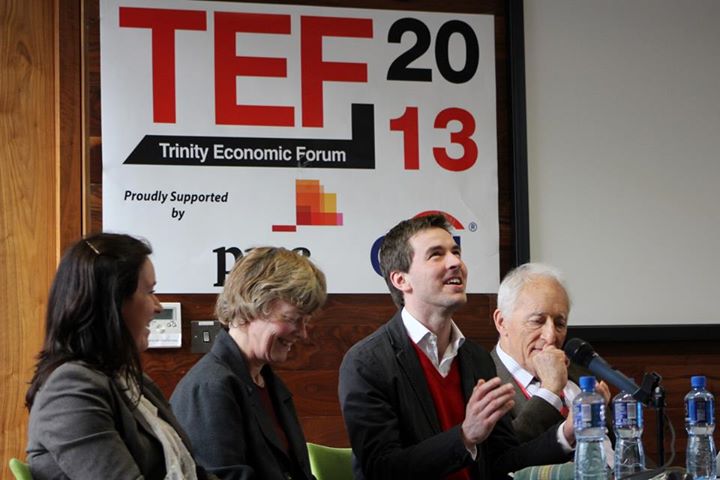Finn Keyes | Current Affairs Editor
One of the newest and most exciting dates on the college calendar is the Trinity Economic Forum and preparations are under way for the 2014 installment which is to take place on the 14th and 15th February. I sat down with this year’s coordinator and co-founder Gary Finnerty to discuss the history, mission and future of the forum.
Gary, a 4th year BESS student, and two fellow students, Patrick Lynch and Seán Gill, sat down three years ago and came up with the core idea of TEF which was to “engage students in economic discourse of contemporary issues, on issues which might not be to the fore in traditional lectures and business syllabi, and to create a platform from which student thinkers could influence policy making.”
The two forums which we have enjoyed so far have been notable for some very progressive speakers, especially the inaugural address delivered by President Higgins which was a stirring appeal for a return to a socially and ethically responsible business environment. Nonetheless, Gary is keen to stress that the forum is an “agnostic platform for students to make up their own minds” as to the best way to shape financial and economic policy for the future and the forum itself, perhaps by definition, doesn’t have a policy agenda or mission. “The forum remains unbiased and allows students themselves to shape policy though student perspectives will naturally tend towards a new or liberal standpoint.”
A key feature of the forum to date has been the policy workshops where like minded students have joined forces to create policy ideas and proposals which are then forwarded on to the Department of Finance. However, the Department receives a huge number of such proposals and often don’t act upon student initiatives as the proposals get lost in the mail bags. A major new initiative of this year’s forum seeks to build and improve on this, with the best proposal now receiving ‘The Department of Finance Award for Policy Advancement’ and a paid internship and opportunity to help oversee the implementation of their policy idea and get a substantial education in policy development more generally. Gary spoke of his excitement at having “student ideas in government policy” and sees it as a major step forward for the forum to see a tangible policy result from student submissions.
This year’s forum will also seek to bring more international speakers to the event with a hope perhaps gaining new perspectives on issues. The two speakers announced so far are Casey B. Mulligan of the University of Chicago and Martin Hellwig of the University of Bonn, Germany, with more distinguished speakers from the UK such as Simon Kuper from the Financial Times to be formally announced soon. Previous speakers have stressed the value of student feedback and discussion and interaction and networking with the speakers is an integral part of the forum.
Acknowledging its setting and surroundings, the forum will address on the Friday night the state of the third level education system and the merits or otherwise of partial privatization as well as an investigation of teaching methods, with questions such as the role of online learning, in a discussion chaired by David McWilliams entitled ‘Third Level Education: Broke, Broken or Both?’. There will be a number of speakers on the topic including Professor Ferdinand von Prondzynski, the former President of DCU and outspoken campaigner for third level education reform. Gary encourages students to get involved in this discussion and indeed to attend all of the exciting talks over the course of what promises to be an informative and enlightening weekend.
Photo by Caitriona Gallagher







